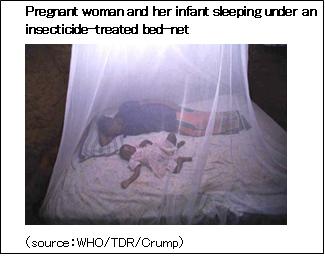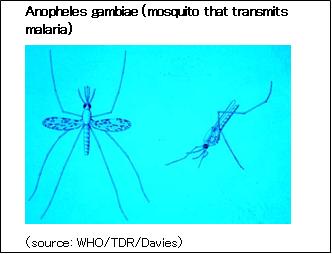The Hideyo Noguchi Africa Prize 2008 - PRESS RELEASE -
26 March 2008, Tokyo
The Government of Japan announces today its decision to award the inaugural Hideyo Noguchi Africa Prizes to Brian Greenwood and Miriam K. Were.
The laureates of each category will be awarded a citation, a medal and an honorarium of 100 million yen (approximately 1 million US dollars) at the award ceremony on 28 May 2008 within the TICAD IV.
Medical Research
 Brian Greenwood, born 1938 in the UK; British citizen; MD 1968 University of Cambridge, UK; Manson Professor of Clinical Tropical Medicine, London School of Hygiene and Tropical Medicine, UK.
Brian Greenwood, born 1938 in the UK; British citizen; MD 1968 University of Cambridge, UK; Manson Professor of Clinical Tropical Medicine, London School of Hygiene and Tropical Medicine, UK.
The Hideyo Noguchi Africa Prize for medical research is awarded to Brian Greenwood for his bold and innovative work on malaria. At a time when malaria was spreading uncontrollably across the African continent claiming more than 1 million lives a year, Greenwood contributed to creation and designing of effective strategies to control malaria. His crucial contributions in malaria research greatly helped developing the tools and knowledge that are essential in turning the tide on this terrible disease. His work brings hope where very recently only despair existed.
Pioneering field research on malaria
Greenwood has spent more than 30 years on site in Africa including 15 years as Director of the MRC Laboratories in the Gambia where he pioneered landmark research contributing to the understanding of the immunology, pathogenesis and epidemiology of malaria, a major killer in Africa, and other infectious diseases such as meningitis and pneumonia, all major contributors to mortality among children in Africa. His research and translational clinical studies, involving simple but high quality methods as well as field trials of drugs and vaccines, have provided the scientific underpinning to a wide range of influential public health policies at national and international levels. His important contributions include:


- Demonstration of the effectiveness of insecticide-treated nets for control of malaria, which is now the cornerstone of malaria interventions throughout the continent, supported and financed by many donor agencies
- Primary studies on artemisinin-based combination therapies (ACTs), now widely adapted as first-line treatment for malaria
- Demonstration that malaria chemoprevention reduces child mortality. This is now being applied for intermittent preventive treatment in infants, children and in pregnancy
- Substantial contributions to trials of malaria vaccines, including the efficacious RTS, S vaccine
- Demonstration of how Haemophilus influenzae type b (Hib) infection can be eliminated by vaccination
- Large-scale clinical trials showing the potential for reducing child morbidity and mortality through use of pneumococcal conjugate vaccines
- Substantial contributions to the development of meningococcal vaccines
Transforming the limits of tropical medicine
 Another important aspect of Greenwood's achievements is his reinvention of field research in tropical medicine - changing it from an ancillary colonial or military activity focusing on hygiene to a multi-partite, multi-disciplinary endeavor, wherein holistic solutions are required - based on cutting-edge science and a genuine understanding of the complex eco-system as well as real-life challenges unique to Africa. Thus laboratory and clinical research, preventive and curative medicine, epidemiology, anthropology, and behavioral research were all brought together. These modern approaches which we now take for granted came from Greenwood's prescience and leadership.
Another important aspect of Greenwood's achievements is his reinvention of field research in tropical medicine - changing it from an ancillary colonial or military activity focusing on hygiene to a multi-partite, multi-disciplinary endeavor, wherein holistic solutions are required - based on cutting-edge science and a genuine understanding of the complex eco-system as well as real-life challenges unique to Africa. Thus laboratory and clinical research, preventive and curative medicine, epidemiology, anthropology, and behavioral research were all brought together. These modern approaches which we now take for granted came from Greenwood's prescience and leadership.
Research partnership with Africa
Over the years, Greenwood has made capacity building - another lasting legacy of his research based on African soil - a central objective including the training and support of young African scientists. A cohort of students, doctors, and clinicians who developed their careers under Greenwood's inspirational mentorship has immensely contributed to the increase in stature of medical research in Africa amongst the scientific community in general.
